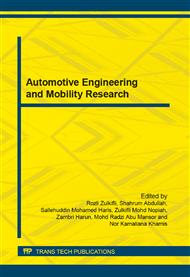p.152
p.158
p.163
p.169
p.175
p.185
p.193
p.198
p.203
Pre Crash Wheel-Locking Braking System
Abstract:
Nowadays, most of the passenger cars are equipped with anti-locking brake system (ABS) in order to provide better safety protection to vehicle occupants. Despite its advantages, it has been reported in the public domain that the ABS could be one of the causes in fatal frontal/rollover crashes on dry roads. This paper is first attempting to reveal the shortcomings of ABS that lead to high fatality rate. Then, in order to overcome these ABS shortcomings, a potential system called pre crash wheel-locking braking (PWLB) system is conceptually proposed. The PWLB system works by locking both front and rear wheels simultaneously that based on speed and distance between the leading and the following vehicles. With this PWLB concept it is expected that braking effect during the vehicle crash up to 2.5 meter before reaching to the occupants can be maintained. As a result, it can provide maximum braking force and improve ability to steer to the vehicle before crashing with the leading vehicle.
Info:
Periodical:
Pages:
175-184
DOI:
Citation:
Online since:
October 2014
Authors:
Keywords:
Price:
Сopyright:
© 2014 Trans Tech Publications Ltd. All Rights Reserved
Share:
Citation:


